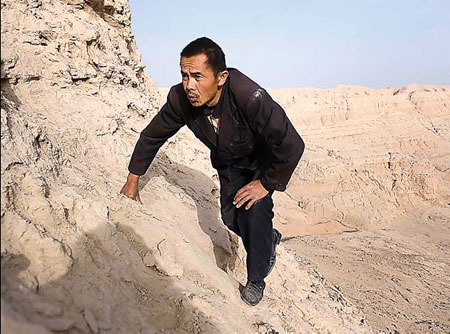Contemporary caveman

 |
| Rahman Amut is on his way to inspect the 1,600-year-old Kizilgahr Grottoes in Xinjiang Uygur autonomous region. [Liu Jie / Xinhua] |
"The stone once stood opposite the grottoes, like a guardian," the 39-year-old ethnic Uygur says. "It had long eyes and thick lips. I would say 'hello' to it every day."
Since his "stone man" was destroyed, Amut has been alone in the grottoes, where he has lived with no other company for 18 years. Nobody even knows the man in the dusty black jacket lives there.
Amut has served as the guardian of the 1,600-year-old Kizilgahr Grottoes since 1993. The site in the Xinjiang Uygur autonomous region's Kuqa county hosts important Buddhist relics from the ancient Silk Road.
The grottoes burrow into the vast sandstone mountain wilderness 12 km outside of the county. Water must be carried in from elsewhere.
Amut says the "happiest event" in his entire time at the grottoes was when the road was built in late 2011.
"I don't know much about the grottoes and Buddhism, because I'm Muslim," he says.
"But since I've seen many scholars from home and abroad visit, I realize it's a national treasure and I must protect it."
But visitors are few and far between. The State-protected relics site isn't open to the public.
Amut's friend, who works in nearby Baicheng county, brings him a bag of outdated Uygur-language newspapers every two months.
"Night is the most difficult time (to bear)," the man says, in his shanty at the grottoes' entrance.
The shack is incredibly simple. It contains a stove, a wooden bed, two big plastic water buckets and an oil lamp full of greasy black dust. Five large naan (Uygur flatbread) hang on the wall.
The only electrical appliance is a radio.
Amut got electricity after the road was built. But the supply isn't stable, he says.
"I prefer reading newspapers by the oil lamp and listening to the radio in the dark," he says.
Amut's routine is to read newspapers and then sleep after the radio night programs finish. He suffered terrible insomnia when no scholars or newspapers came for 89 days. He couldn't fall asleep until about 6 am and then would only grab about three hours of shuteye.
He eventually developed a method to help him snooze - that is, wearing himself out by jogging in the dark around the grottoes for at least an hour and a half. "I can fall asleep easier if my body is exhausted," he says.
A small group of scholars arrived on the 90th day. But Amut had become afraid of talking after so long in isolation.
"It's difficult to describe the anxiety of yearning to see people when you're alone for so long," he says, in broken Mandarin.
Two other young men worked Amut's job for fewer than three months before they quit and he took the post. He earns barely 2,000 yuan (240 euros) a month for the job.
He says loneliness has left scars and changed him from the man who took the job.
"I was totally different the first couple of years," he says. "I was young - just 21 years old - and full of energy and enthusiasm."
He once raised 40 pigeons, 16 chickens and a dog. But the desert summer's temperatures surpass 40 C.
The heat killed the chickens. The pigeons flew away. And the dog's paws burned on the sand.
"Only man can live in here," he jokes.
He also planned to dig a well in front of the shed. His father and brother helped him dig for seven months but they never reached water.
His wife left him in 2001, taking their child with her.
"I'm as lonely and quiet as the grottos," he says, with a sigh.
Amut used to hate dancing but now does it to entertain himself. He says his ears have become sharp, and he can hear the faintest sounds of vehicles in the distance.
He behaves like the Buddhist ascetics who dwelled in the carved caverns more than 1,000 years ago. When visitors come, he guides them to the caves and silently squats in the corner.
He inspects the 54 grottoes three times, taking three hours per round, to monitor and record any small changes.
shaowei@chinadaily.com.cn
Today's Top News
- Xi calls for promoting volunteer spirit to serve national rejuvenation
- Xi chairs CPC meeting to review report on central discipline inspection
- Reunification will only make Taiwan better
- Outline of Xi's thought on strengthening military published
- Targeted action plan to unleash consumption momentum
- Separatist plans of Lai slammed






























